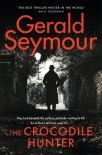The Crocodile Hunter by Gerald Seymour (english novels to improve english txt) 📗

- Author: Gerald Seymour
Book online «The Crocodile Hunter by Gerald Seymour (english novels to improve english txt) 📗». Author Gerald Seymour
The building towered over him.
It was, for Cammy, the end of a pilgrimage. This was the place he had to come to if he were to purge an old life and prepare for his last actions.
The cathedral was, as he knew, a place of death, of violence and of bloody struggles for power. Was also, and this had been dinned into him when he was a valued part of the majesty of it, a symbol of power and of authority. He was outside the gate policed by cathedral constabulary, but he stayed inconspicuous, waited with his head tucked down until a party of schoolchildren, German, were ushered through. A teacher at the front had negotiated the group’s entry, and another teacher was at the rear and, as they came past him, he took the necessary half pace to his left and was swept forward.
Inside, he stopped, gazed around him, and above, and drank it in. He had not stood here since the day that he had been dumped off the choir, and his mother had come to collect him – would have taken time off work, and had puffed and reddened eyes and had tried to hurry him away. He had snatched his hand from hers and had paused to look up and into the dark rain clouds and see the height of the Bell Harry Tower, and the glory of the glass, look at it a last time. Then had turnd and walked briskly, never twisted to glance behind him, and his mother had had to chase after him, and they had taken the bus home to Sturry, and his dream had been taken from him. Had often thought of this place, and its effect on his life when he had been with his brothers. Had talked of it. Had sung to them, quiet all around him, or just hummed the tunes, and the only interruption might had been a stray incomer, 110mm or 151mm, from the enemy’s artillery.
Could remember the first day, being brought here by his mother, pride creasing her tired face, and him sauntering in with a hand in his shorts pocket. A new blazer, and a tie he barely knew how to knot. They could have gone to the building where the choristers lived but his mother had wanted the taxi – rash expenditure for her – to drop them at the cathedral. She had struggled with his case, and he had not helped her, and they had gone inside after the rain had spattered them and left diamonds on her hair: he would have liked, that afternoon, to kiss them from her head but had not done so. This was to be his new home, and he was a chosen one. They did scores of auditions, chose only the best, and he wore the black shoes and grey socks and the short trousers and white shirt and tie and the blazer to prove his status.
He went through the doorway into the great cavern of the building. A guide sidled up to welcome the German party. Cammy loitered and listened. A teacher translated. The guide said nothing about the glories of worship, private prayer, or the joys of choral music. He talked of the killing of one archbishop, and the decapitation of another, and of the great, revered and feared, fighting men of their time. He spoke of the looting of the building by a monarch determined to break the power of the Roman church, and the carrying off of 26 cartloads of valuables – gold pieces, silverwork, statues fashioned from rare Italian marble – and the memories were sharpened for Cammy of how it had been in what had seemed to be the pinnacle of his life. And the guide told the kids of the consequence of a Royalist defeat when civil war had split the nation, and how the cold men who were the victors had vandalised the interior – what he called “mindless destruction” – and the great multi-coloured windows had been smashed by men on high ladders, and the glass they could not reach was broken by musket balls . . . and mentioned a later war, did not name the nation then arrayed against Britain, and said bombs had fallen on the city but by some intervention, luck or divine, the cathedral had been spared.
The guide began to walk forward, and the kids followed. Cammy had time to lose . . . for the first time since he had gone into the water, the matter of his freedom concerned him. It could have been the quiet of the ancient building, or the depth of the shadows thrown down, but he felt a chill on his neck. Cammy had not considered that he might be a hunted man. He would not advertise his presence, of course not, but the matter of whether some official apparatus was actively searching for him had not occurred to him.
He would return, he would come to the cathedral which had shaped so much of his life, he would visit his mother, then move onto his last journey. He had been told where he would meet a facilitator who would have the photographs and maps of the target and who would bring him the weapon that he would use . . . All that was clear, but the chill on his skin, under his unfamiliar shirt collar, seemed to warn him of danger.
No one to ask, and no brother from whom he could take confidence. He was alone . . . he shivered and the hugeness of the building seemed to close around him. He swayed on his feet, then was aware that he attracted attention.





Comments (0)